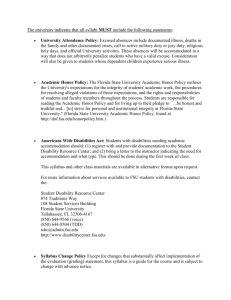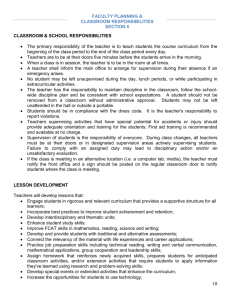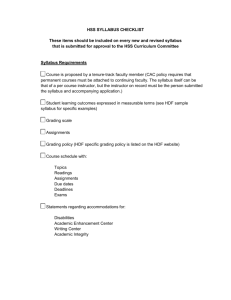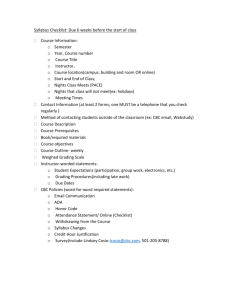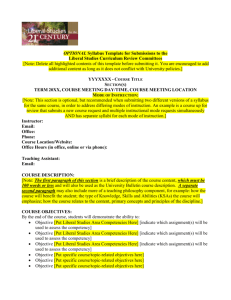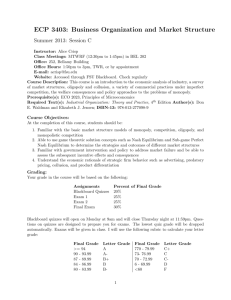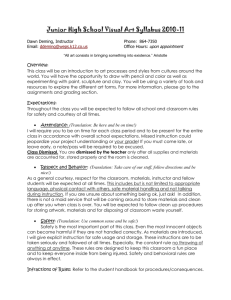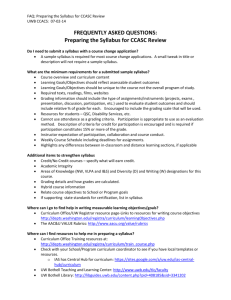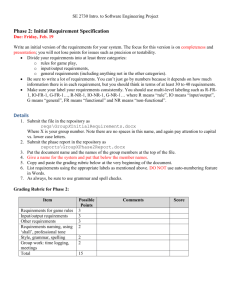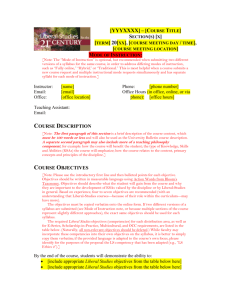student course syllabus - College of Education
advertisement
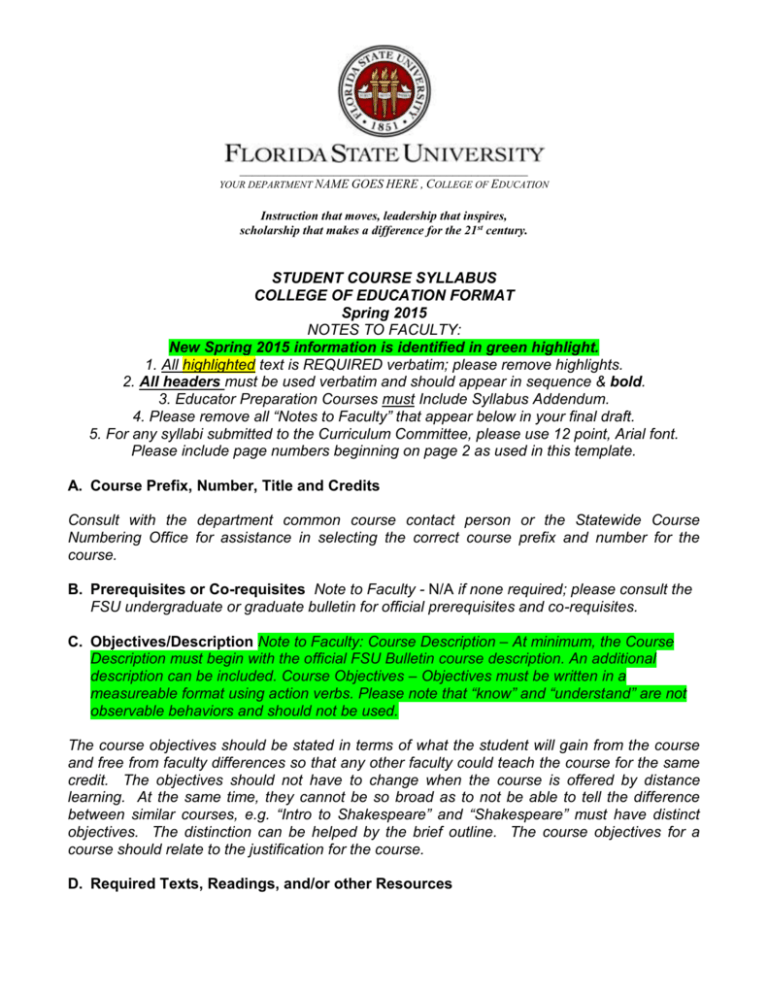
______________________________________________ YOUR DEPARTMENT NAME GOES HERE , COLLEGE OF EDUCATION Instruction that moves, leadership that inspires, scholarship that makes a difference for the 21st century. STUDENT COURSE SYLLABUS COLLEGE OF EDUCATION FORMAT Spring 2015 NOTES TO FACULTY: New Spring 2015 information is identified in green highlight. 1. All highlighted text is REQUIRED verbatim; please remove highlights. 2. All headers must be used verbatim and should appear in sequence & bold. 3. Educator Preparation Courses must Include Syllabus Addendum. 4. Please remove all “Notes to Faculty” that appear below in your final draft. 5. For any syllabi submitted to the Curriculum Committee, please use 12 point, Arial font. Please include page numbers beginning on page 2 as used in this template. A. Course Prefix, Number, Title and Credits Consult with the department common course contact person or the Statewide Course Numbering Office for assistance in selecting the correct course prefix and number for the course. B. Prerequisites or Co-requisites Note to Faculty - N/A if none required; please consult the FSU undergraduate or graduate bulletin for official prerequisites and co-requisites. C. Objectives/Description Note to Faculty: Course Description – At minimum, the Course Description must begin with the official FSU Bulletin course description. An additional description can be included. Course Objectives – Objectives must be written in a measureable format using action verbs. Please note that “know” and “understand” are not observable behaviors and should not be used. The course objectives should be stated in terms of what the student will gain from the course and free from faculty differences so that any other faculty could teach the course for the same credit. The objectives should not have to change when the course is offered by distance learning. At the same time, they cannot be so broad as to not be able to tell the difference between similar courses, e.g. “Intro to Shakespeare” and “Shakespeare” must have distinct objectives. The distinction can be helped by the brief outline. The course objectives for a course should relate to the justification for the course. D. Required Texts, Readings, and/or other Resources E. Topical Course Outline Note to Faculty – Please include the FULL SEMESTER OUTLINE. This may appear at the end of your syllabus if preferred but must be Section E for all syllabi submitted to the Curriculum Committee, per University Committee requirements. F. Teaching Strategies Note to Faculty – This should be a 1-2 sentence statement outlining the methods of instruction you will use in this course (e.g., lecture, discussion, material, fieldwork, group work, inquiry, etc.). This statement should not discuss student assignments. The following is a sample sentence that could be used for a lecture-based course: "The methods of instruction for this course include lecture, large and small group discussion, video, and guest speakers." G. Field/Clinical Activities Note to Faculty - N/A if not applicable; include the approximate number of hours and activities if applicable. H. Expectations/Attendance University Attendance Policy Note to Faculty – The University Attendance Policy was changed slightly (2nd sentence) by Faculty Senate; please use the below statement as this is different than Fall 2012. Excused absences include documented illness, deaths in the immediate family and other documented crises, call to active military duty or jury duty, religious holy days, and official University activities. These absences will be accommodated in a way that does not arbitrarily penalize students who have a valid excuse. Consideration will also be given to students whose dependent children experience serious illness. Netiquette Statement Note to Faculty – A Netiquette Statement must be added to ALL ONLINE Courses, but the actual statement may differ. Below is an example of a Netiquette statement that may be used but you may substitute your own. Please use the first line “Considering…” Considering online classes will take place in a variety of settings, it is important to have a reference point for successful participation in this online environment. [Insert your Netiquette statement here or use the below wording] Be mindful of the Core Rules of Netiquette taken from Virginia Shea’s Book and Website "http://www.albion.com/netiquette/corerules.html" Rule 1: Rule 2: Rule 3: Rule 4: Rule 5: Rule 6: Rule 7: Remember the Human. Adhere to the same standards of behavior online that you follow in real life. Know where you are in cyberspace. Respect other people’s time and bandwidth. Make yourself look good online. Share expert knowledge. Help keep flame wars under control. Page 2 of 6 Rule 8: Respect other people’s privacy. Rule 9: Don’t abuse your power. Rule 10: Be forgiving of other people’s mistakes. Sexual Harassment Policy Note to Faculty - The following Sexual Harassment policy must be in the syllabus. Sexual harassment is a form of discrimination based on a person's gender. Sexual harassment is contrary to the University's values and moral standards, which recognize the dignity and worth of each person, as well as a violation of federal and state laws and University rules and policies. Sexual harassment cannot and will not be tolerated by the Florida State University, whether by faculty, students, or staff; or by others while on property owned by or under the control of the University. Course Expectations Note to Faculty: Insert here your specific course attendance expectations that are not reflected in the above University Attendance Policy. These may include attendance, participation, notification to instructor, etc. I. Grading/Evaluation Note to Faculty – Please use only percentages or numbers for grades – do not use both simultaneously - use one grading format) Indicate what criteria will be used to evaluate students and the types of assessment measures that will be used, e.g. types of tests, essays, projects, performances, etc. Note that while this statement need not include exact percentages to be assigned each course component, it should be possible to discern the approximate weight to be given each component. In other words, it is not sufficient to state merely, “students will be evaluated on the basis of tests, term papers, and class participation,” unless those components are to be given equal weight in the assignment of final grades. The criteria must be made available at the beginning of the semester and in a format the students will see. Descriptions of each assignment should be included in this section. Instructors should indicate in writing to what extent students may engage in collaboration/group work on specific assignments and whether multiple submissions are allowed, if applicable. If percentages are used, professors are encouraged to provide a translation of % averages into the letter grade. It cannot be changed during the course of the semester. Changing the order in which assignments are due, or substituting a review on a particular book or play for another does not constitute a change in grading standards. Note that if a course is S/U, the criteria must also be stated. A grading scale should be included with all grades from A-F and +or- if included in your grading method. USE THE FOLLOWING GRADE SCALE FORMAT (“Total of XXX points will be given” or explain grading with percentages) Page 3 of 6 MUST CHOOSE ONE OR THE OTHER AS FAR AS GRADING FORMAT A = 93-100% or (465-500) A- = 90-92% or (450-464) B+ = 87-89% or (435-449) B = 83-86% or (415-434) B- = 80-82% or (400-414) C+ = 77-79% or (385-399) C = 73-76% or (365-384) C- = 70-72% or (350-364) D+ = 67-69% or (335-349) D = 63-66% or (315-334) D- = 60-62% or (300-314) F = below 60% or (<299) Free Tutoring from FSU On-campus tutoring and writing assistance is available for many courses at Florida State University. For more information, visit the Academic Center for Excellence (ACE) Tutoring Services’ comprehensive list of on-campus tutoring options - see http://ace.fsu.edu/tutoring or contact tutor@fsu.edu. High-quality tutoring is available by appointment and on a walk-in basis. These services are offered by tutors trained to encourage the highest level of individual academic success while upholding personal academic integrity. J. Honor Code Note to Faculty - This honor code statement below must be in syllabus. The Social Media statement is optional but strongly recommended! The Florida State University Academic Honor Policy outlines the University’s expectations for the integrity of students’ academic work, the procedures for resolving alleged violations of those expectations, and the rights and responsibilities of students and faculty members throughout the process. Students are responsible for reading the Academic Honor Policy and for living up to their pledge to “. . . be honest and truthful and . . . [to] strive for personal and institutional integrity at Florida State University.” Florida State University Academic Honor Policy, found at http://fda.fsu.edu/Academics/Academic-Honor-Policy. Please be aware that using social media to collaborate on and share course exams or assignments with other students that are not identified by the course instructor as group work is a violation of the FSU Academic Honor Policy. K. ADA Requirements Note to Faculty - This statement & information below must be included in syllabus. AMERICANS WITH DISABILITIES ACT: Students with disabilities needing academic accommodation should: (1) register with and provide documentation to the Student Disability Resource Center; and (2) bring a letter to the instructor indicating the need for accommodation and what type. This should be done during the first week of class. This syllabus and other class materials are available in alternative format upon request. Page 4 of 6 For more information about services available to FSU students with disabilities, contact the: Student Disability Resource Center 874 Traditions Way 108 Student Services Building Florida State University Tallahassee, FL 32306-4167 (850) 644-9566 (voice) (850) 644-8504 (TDD) sdrc@admin.fsu.edu http://www.disabilitycenter.fsu.edu/ L. Syllabus Change Policy Note to Faculty – This Statement must be included in syllabus. Except for changes that substantially affect implementation of the evaluation (grading) statement, this syllabus is a guide for the course and is subject to change with advance notice M. Bibliography Note to Faculty – The Bibliography is now optional and is no longer required by the University Curriculum Committee for Curriculum Requests! Note to Faculty – If you include a Bibliography, please ensure that the bibliography is in alphabetical order and in APA format. Syllabus Addendum for Educator Preparation Courses Ideas that move, leadership that inspires, scholarship that makes a difference for the 21st century. Note to Faculty - This statement should be included on all Educator Preparation Course Syllabi, including all courses required for teacher education, educational leadership, and school psychology preparation programs. Objectives Matrix Objective 1. 2. 3. 4. 5. 6. 7. 8. FEAP (Replace with name Florida of program Competencies Professional ESOL and Skills Standards) Page 5 of 6 9. 10. Assignments Critical Tasks are marked with * in front of the assignment number. Assignment 1. (Text of assignment and when grading rubric will be available or if rubric is appended) Course Objective(s) Accomplished Practice(s) ESOL Competency (Competencies) Subject Area Content Standards (Replace with name of program Professional Standards) Assignment 2. (Text of assignment and when grading rubric will be available or if rubric is appended) Course Objective(s) Accomplished Practice(s) ESOL Competency (Competencies) Subject Area Content Standards (Replace with name of program Professional Standards) Assignment 3. (Text of assignment and when grading rubric will be available or if rubric is appended) Course Objective(s) Accomplished Practice(s) ESOL Competency (Competencies) Subject Area Content Standards (Replace with name of program Professional Standards) Continue to list all Assignments in the above format! Page 6 of 6
